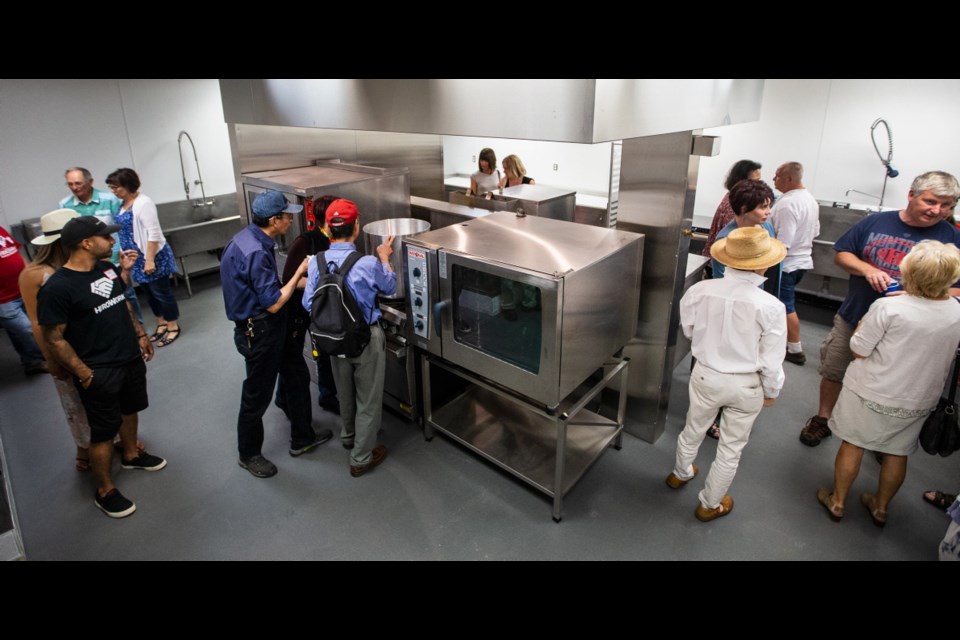HeroWork lives up to its name.
Fuelled by volunteers and donors, the seven-year-old group has completed renovation projects for a wide range of agencies around the capital region, from Beacon Community Services to the Quadra Village Community Centre and the Threshold Housing Society.
“All of the labour and things like that, about 98 per cent, are volunteer, from professionals and architects to plumbers and the general volunteer who helps out,” said HeroWork executive director and founder Paul Latour. “It’s not just a renovation, it’s a community event.”
This year, HeroWork has taken on two projects involving the Mustard Seed Street Church, with an overall cost of about $900,000 — all of it accomplished with only four paid staff.
For the past several weeks, the task has been to install a commercial kitchen at a Viewfield Road warehouse, known since March 2017 as the Food Rescue Distribution Centre. Supporters include the Victoria Foundation, the Rotary Clubs of Greater Victoria and Thrifty Foods.
The centre serves the Mustard Seed and the Food Share Network, but other organizations will also be able to make use of it.
Mustard Seed director of development Janiene Boice said the kitchen will make an enormous difference to the groups involved.
“The Mustard Seed is the operational partner,” said Latour. “The Food Share Network works with over 60 other organizations to say who needs what and when, and they’re the ones that inform the Mustard Seed to go here, here and here.”
As the partner charity, the Mustard Seed is providing money equivalent to 30 per cent of the approximate value of the job.
A key advantage of having a commercial kitchen is that much less food will be wasted than has been the case, Latour said. For example, vegetables and other perishable food donated by grocery stores — which Mustard Seed volunteers sort through six days a week — will be properly preserved.
“There’s a percentage of all that they’re doing that goes in the compost bin,” Latour said. “So instead of going in the compost, it’s going to be processed into soups, sauces, maybe stews.”
Having the commercial kitchen will ensure an extra 18,100 kilograms of food per year is kept for consumption.
Boice said eight per cent of the food coming to the warehouse is wasted in the process of being “cleaned and gleaned.”
“We’re now, with this processing kitchen, able to take that eight per cent waste and bring it down to less than four per cent. Our goal is to get to a zero-waste facility.”
Many of the food-sorting volunteers are from Camosun College, while Camosun culinary arts chairman Steve Walker-Duncan and Ryan Gibson of Sysco Food Services have helped with the kitchen design.
Wayne Thompson of Thomis Electric said the company had four workers together at the warehouse for a couple of nights of preliminary effort before joining in for some major installation work.
“We did some of the infrastructure. There’s a big cable along the top of the wall there we’ve installed and a new panel, things like that.”
He said the company is happy to help.
“It’s just a good community thing,” Thompson said. “As a trade you don’t always get that many chances to give back.”
Madeleine Duncan, who was keeping the food table stocked for hungry workers during a recent warehouse session, said it is a team effort that gets the job done for HeroWork.
She said she likes the idea of so many people working together “to do a project that’s going to have such a powerful impact on our community.”
Duncan said she read about the project being for the Mustard Seed and had to take part.
“Mustard Seed has been my passion for many years, and I would do whatever I could to be able to just help them in any way, empower people to be the best that they can be,” she said. “We all have our little roles to do and we do them to the best of our ability.”
HeroWork has an impressive list of completed projects from 2017.
“Anawim House last year was a residential house, a homeless transition centre,” Latour said. “We did Power to Be, which was a recreational therapeutic hub outside at Prospect Lake, then the Rainbow Kitchen.”
Latour started HeroWork with no experience in construction.
“I come from the hospitality industry,” he said. “I was also a painter and a writer, so an artistic background and a hospitality background.”
It all served him well, he said.
“I was able to connect with people, organize things, tell a story. I found that I could bring in the skillsets on the construction element, so project managers, all the key stakeholders that are involved.
“You bring in the electrician with 40 years experience, the plumber with 40 years experience.”
Latour said the Viewfield Road project has involved about 300 people.
“It takes several months to prepare, to line everything up, all the little details and all the scheduled shifts and making sure that everything gets done in sequence and on time,” he said.
The job itself is relatively fast by comparison.
Latour said he is constantly looking ahead.
“We’re always working with charity partners for the future. It looks like we already have 2019’s projects locked up.”
The other project this year will be in the fall at the Mustard Seed’s Queens Road location, where a “grocery store” area for choosing food-hamper items will be built. Latour said the idea is that allowing people to choose their food will cut down on waste.
In addition, the upper floor of the Mustard Seed building will be extended over top of the store facility.
“We’ll increase their operational space by 25 per cent,” Latour said.



